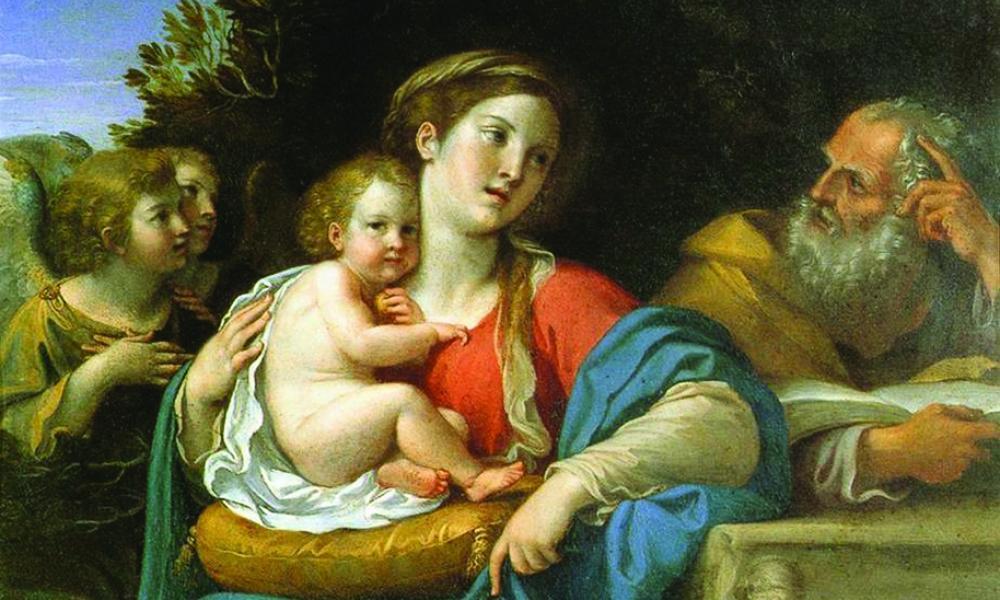
The Domestic Church
Since one of the themes discussed during the Ordinary Synod of Bishops related to the Family in October is the domestic church, Theology 101 explores the Church’s teaching on this theme, as well as the vocation and mission of the family in general both in the Church and in the modern world.
A Trinitarian origin
The Church has her origin in the Holy Trinity. From the very beginning, the Church was part of the Father’s plan for salvation. Salvation, we recall, comes from the root word salve which means “to heal, to make whole.” So the Church has always been a part of the Father’s plan of communion, or for sharing his divine life with all people.
Jesus came to fulfill the plan of communion that was the Father’s from the beginning. Jesus, as the heart of this communion, became the “salve” for humanity so that all may be one in God. Apart from his announcing the kingdom of God in both word and deed, Jesus also established the visible structure of the Church through the selection of his Twelve Apostles and his naming of Peter as the head.
The Church was revealed as a visible community empowered to proclaim the Good News of salvation by the Holy Spirit at Pentecost. According to the United States Catholic Catechism for Adults (USCCA), this same Spirit continues to maintain “the stability, durability, and continuity of the Church both in favorable and unfavorable historical circumstances.” (USCCA, 115)
The sacrament of salvation
We know that Christ lives and acts in and with his Church through the sacraments, which communicate his grace. As the actions of the Holy Spirit at work in the Church, sacraments manifest and communicate to humanity the mystery of communion with the God who is love.
At the same time, the Church herself is the sacrament of salvation – “a sign and instrument, that is, of communion with God and of unity among all.” (Catechism of the Catholic Church, no. 775) This salvation is communicated to us by the Spirit through the Church and her seven sacraments.
For her part, the Church and her members are called “to love God, others, and self, and so to be a communal witness of the love by which Christ saved the world.” (USCCA, 119) In other words, because the Church participates in the Trinitarian communion that is God, she is also called to be a source of unity for all people.
A more fundamental community
There is, however, a more fundamental community. To be sure, the family is the “original cell of social life” according to the catechism (2207). It is the natural society in which the man and the woman give themselves in love and in the gift of life. “Authority, stability, and a life of relationships within the family constitute the foundations for freedom, security, and fraternity within society…Family life is an initiation into life in society.”
In much the same way, though, the Relatio Synodi of the Extraordinary Synod of Bishops on the Family expresses the profound truth that the Christian family forms the “fundamental cell” of the parish, diocese and universal Church. It also manifests the Church, for it is in this domestic church, the Relatio Synodi asserts, that a “person begins a Church experience of communion among persons, which reflects, through grace, the mystery of the Trinity.”
Indeed, the family is a microcosm of the universal Church. Like the Church, the family is called to be holy, not because it is perfect, but because of God’s grace at work in it. When it answers this call, the family, or domestic church, becomes, like the Church herself, an icon of the loving communion of the Father, Son and Holy Spirit.
Like the Church, the Christian home is the place where children receive the proclamation of the faith – for the first time! Like the Church, the Christian home is to be a school of virtue and a community of love. In addition, Christ has called all family members, as he has called all the members of the Body of Christ, to union with God through baptism and the other sacraments.
The family also shares in the Church’s mission. It carries out this mission primarily by fostering love in the home. “When family members pray together, engage in lifelong learning, forgive one another, serve each other, welcome others, affirm and celebrate life, and bring justice and mercy to the community, they help each other live the faith and grow in faith.” (USCCA, 376) It is through this familial love that the community of the Church and society more generally are built up.
So what did the Extraordinary Synod have to say?
Because of the importance of the domestic church to her very life, the bishops called on the Church to support families in their Relatio Synodi. The Church needs to be a welcoming community, offering support to parents, in both complex situations and everyday life, “in their work of raising children, accompanying children, adolescents and young people in their development through personalized pastoral programmes, capable of introducing them to the full meaning of life and encouraging them in their choices and responsibilities, lived in the light of the Gospel.”
Food for Thought
Given the importance of the domestic church for the life of the Church and society as a whole, consider the following statistics:
How important is it to you for your spouse to be Catholic?
43% not at all important
26% a little important
24% somewhat important
7% very important
How often do you and your spouse discuss religion and faith?
12% never
27% seldom
44% sometimes
13% frequently
5% very often
How often do you pray (other than at Mass) with your spouse?
54% rarely or never
12% a few times a year
8% once or a few times a month
10% once or a few times a week
16% daily
How often do you read the Bible or other religious or spiritual materials with your spouse?
68% rarely or never
15% a few times a year
11% once or a few times a month
5% once or a few times a week
2% daily
How often does your spouse attend Mass with you?
21% never
19% seldom
14% sometimes
9% frequently
36% always
How often do you participate in parish activities, other than Mass?
54% rarely or never
30% a few times a year
11% once or a few times a month
5% weekly or more
How often do you volunteer or do community service?
50% rarely or never
30% a few times a year
13% once or a few times a month
7% weekly or more
Source: Center for Applied Research in the Apostolate, “Marriage in the Catholic Church: A Survey of U.S. Catholics” (October 2007)
Catechism Quiz
Test your own knowledge of the Church’s teaching on the family by answering the following:
Which of the following does the political community have a duty to the family to ensure?
a) the freedom to establish a family, have children, and bring them up in keeping with the family’s own moral and religious convictions;
b) the protection of the stability of the marriage bond and the institution of the family;
c) the right to private property, to free enterprise, to obtain work and housing, and the right to emigrate.
d) a and b only
e) a, b and c
f) a and c only
Answer: e) a, b and c (Catechism of the Catholic Church, 2211)



